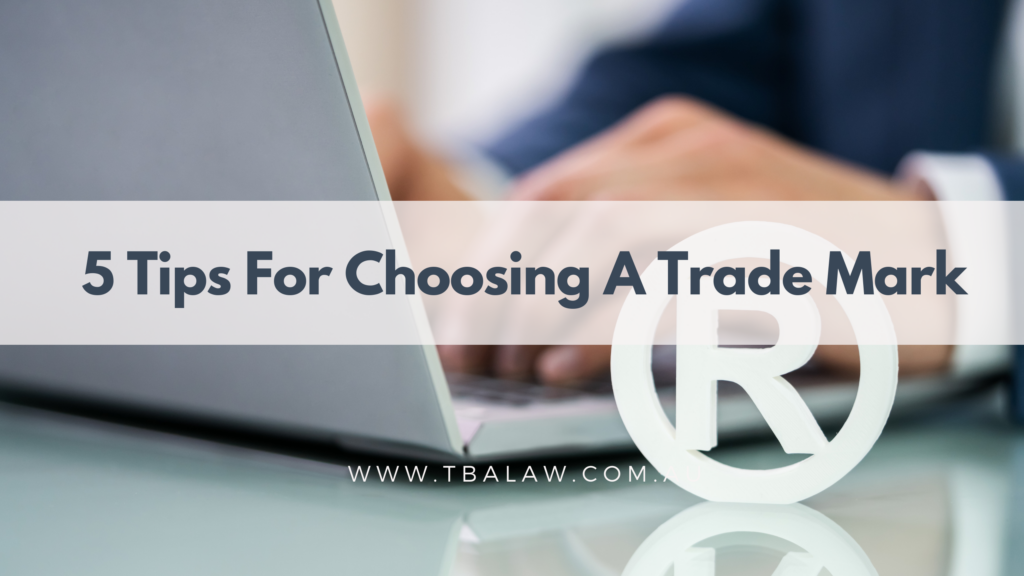Guest Post: 5 Tips for choosing a Trade Mark
By Dr Victoria Longshaw and Dr Carolyn Rolls, Houlihan2 Patent and Trade Mark Attorneys
Unlike business names, there is no legal requirement for a trader to register his/her Trade Mark. It is possible to sell products and services under an unregistered Trade Mark in Australia.
However, this approach could end up being a risky commercial decision.
If your Trade Mark is not registered at IP Australia (the Australian Trade Mark Office), then someone else may register it. They can then start using your Trade Mark, or a Trade Mark that is similar to yours, without your consent.
Registering your Trade Mark makes it easier to protect and enforce your rights against infringers.

However, not all Trade Marks are registrable. In order for a Trade Mark to be registrable, primarily, it needs to be distinctive. This means that it must not be the same or similar to another person’s Trade Mark. It also means that it is not the kind of Trade Mark that other traders are likely to want or need to use, as an ordinary day-to-day word, to describe their Goods.
When choosing a Trade Mark, it makes sense to choose one that is not difficult to register. Not only will a distinctive Trade Mark help make your products or services stand out from the crowd, but it will be easier and more cost-effective to register.
Here are 5 tips to bear in mind when choosing a Trade Mark under which to sell your goods:
1) Invent a new word or logo
New words or logos can become great Trade Marks. They are often considered to be distinctive, because they have no other meaning. Examples of invented Trade Marks include EXXON for petroleum products; the 3-point star logo for Mercedes; and ROLEX for watches.
2) Choose an arbitrary Trade Mark
If you would prefer to use an existing word, then it is better to choose one that bears no relationship to your products or services. Apple Inc. chose this approach when they selected the Trade Mark APPLE for their computer products.
3) Avoid descriptive words or phrases
Many traders make the mistake of choosing a Trade Mark that describes their products or services. This is usually because they want new customers to easily recognise the purpose of the products or services. It can also make their Trade Mark easier to locate online, because it is similar to the keywords that customers are likely to use when searching for products or services to buy. For example, the Trade Mark BLU for blue cheese may be easy to understand and find online, but it will probably be difficult to register.
Unfortunately, while descriptive words and phrases may be great for marketing purposes, they are not likely to be registrable as Trade Marks. Such Trade Marks can also make it difficult for traders to distinguish themselves from their competitors. If you are aiming to make your Trade Mark as distinctive and unique as possible, then it is best to avoid words and phrases that other traders are likely to use.
4) Avoid Trade Marks that are the same as, or similar to, another Trade Mark
It goes without saying that it is good business practice to avoid using a Trade Mark that is the same as, or similar to, another person’s registered or unregistered Trade Mark. Dealing with Trade Mark disagreements can be a costly and damaging exercise. Such Trade Marks can also be difficult and costly to register because they are considered to be confusing for customers.
The above difficulties can be avoided by choosing a distinctive and different Trade Mark from the get-go.
But how do you know if your chosen Trade Mark has not already been taken?
Simple online searches can help. If you can find the same or similar Trade Mark by searching online for similar products or services before you have even started using the Trade Mark, then it is best to avoid using that Trade Mark.
Trade Mark searches of the Australian Trade Mark Register can be carried out online to find similar Trade Marks that have been registered, even if those Trade Marks have not yet been used. The results of such searches can be helpful and cost-effective in certain circumstances.
While such searches can help inform the Trade Mark selection process, it is often more helpful and cost-effective to file a Trade Mark Application and allow an Examiner at the Trade Mark Office to carry out a search for you. This has the advantage of securing an earliest filing date for your Trade Mark Application, while you consider the search results provided by the Examiner, if any.
A trusted Trade Mark Attorney should be able to advise you on whether or not a search needs to be conducted.
5) “Short and sweet” is better than “long and complicated”
While long phrases and slogans could initially appear to be unique and different, they can be problematic. Many traders assume that adding more words to a phrase or slogan will render a Trade Mark more distinctive. However, it can be difficult to register long phrases or slogans if they include a word that is already registered for the same or similar Goods.
Furthermore, even if you manage to successfully register a long phrase or slogan as a Trade Mark, the protection afforded can be relatively narrow. Infringers are more likely to get away with using only a part of a long Trade Mark.
A better approach would be to keep Trade Marks short, particularly when they are in the form of a slogan.
Conclusion
Your Trade Mark is an important and valuable asset. Registering your Trade Mark makes it easier to protect your brand against infringers. It makes sense to choose a Trade Mark that is distinctive and not difficult to register.
Houlihan2 is a Patent and Trade Mark Attorney Firm based in Melbourne, with other Offices in New Zealand, Singapore and Malaysia. They assist clients in securing and maintaining Intellectual Property Rights, including Patents, Trade Marks, Designs and Copyright that align with their business goals.





Leave A Comment